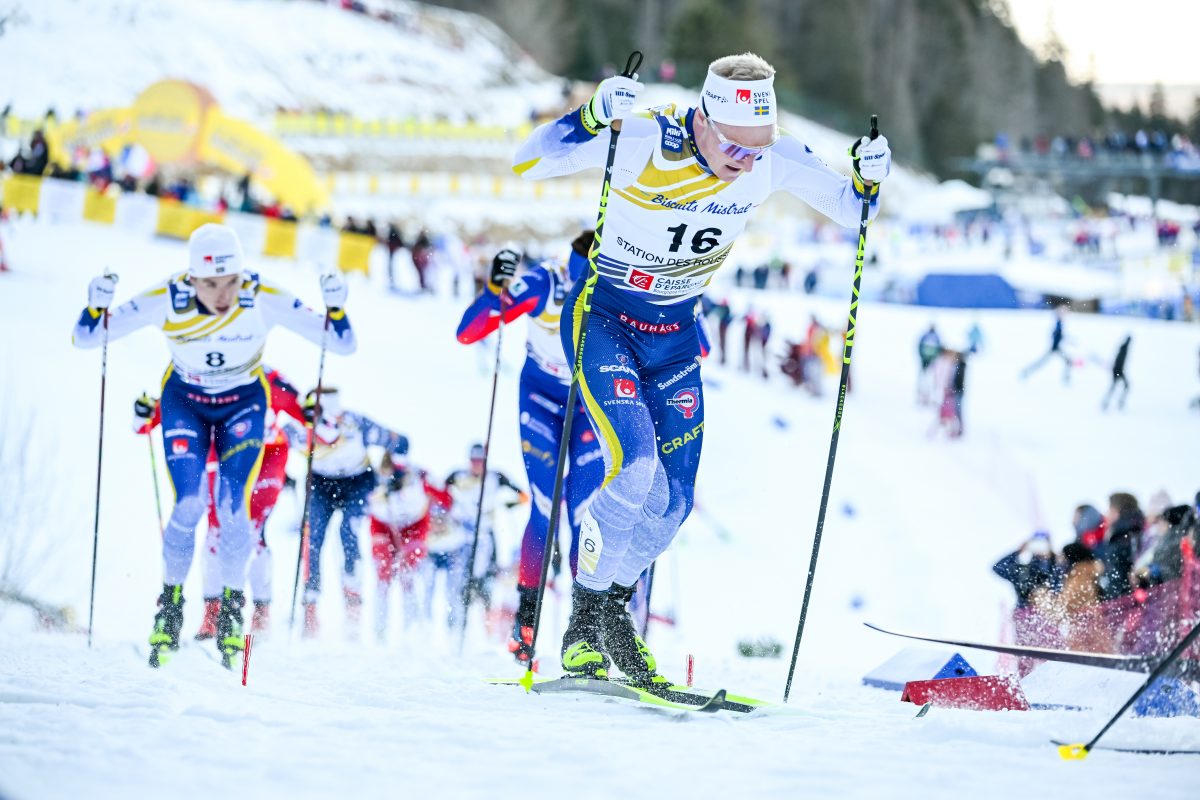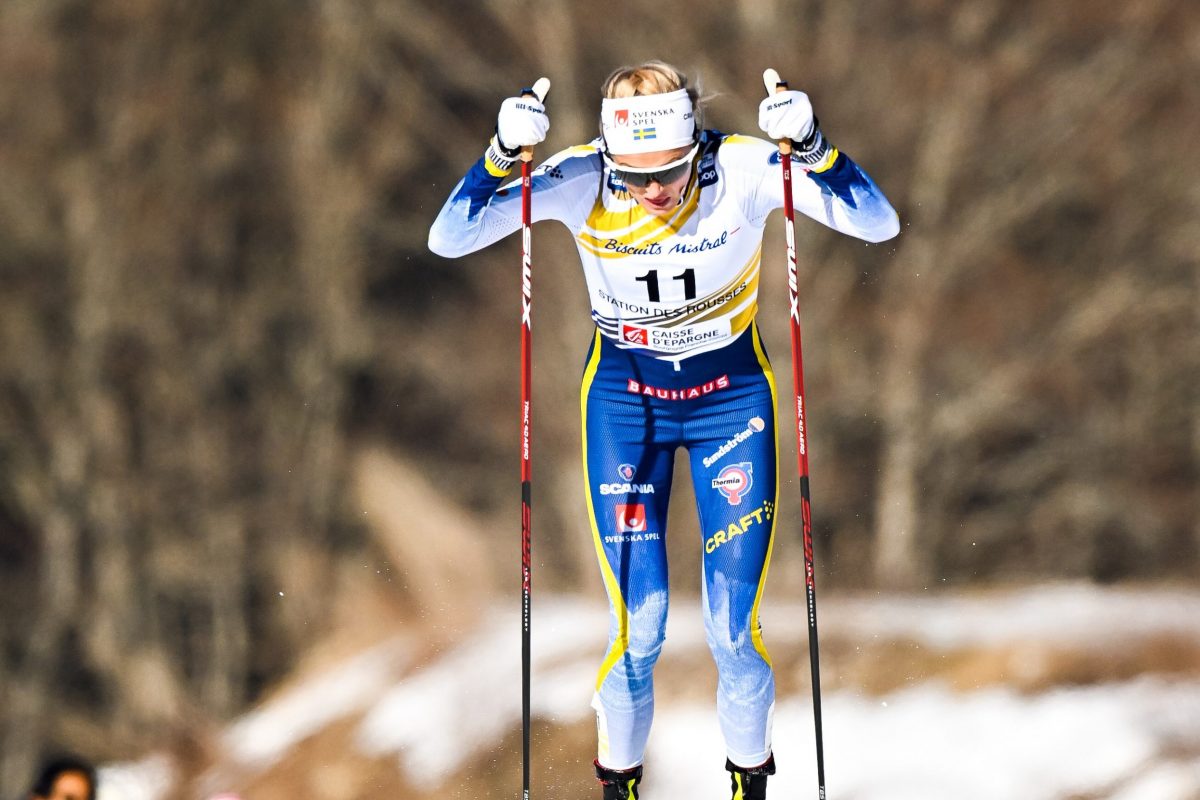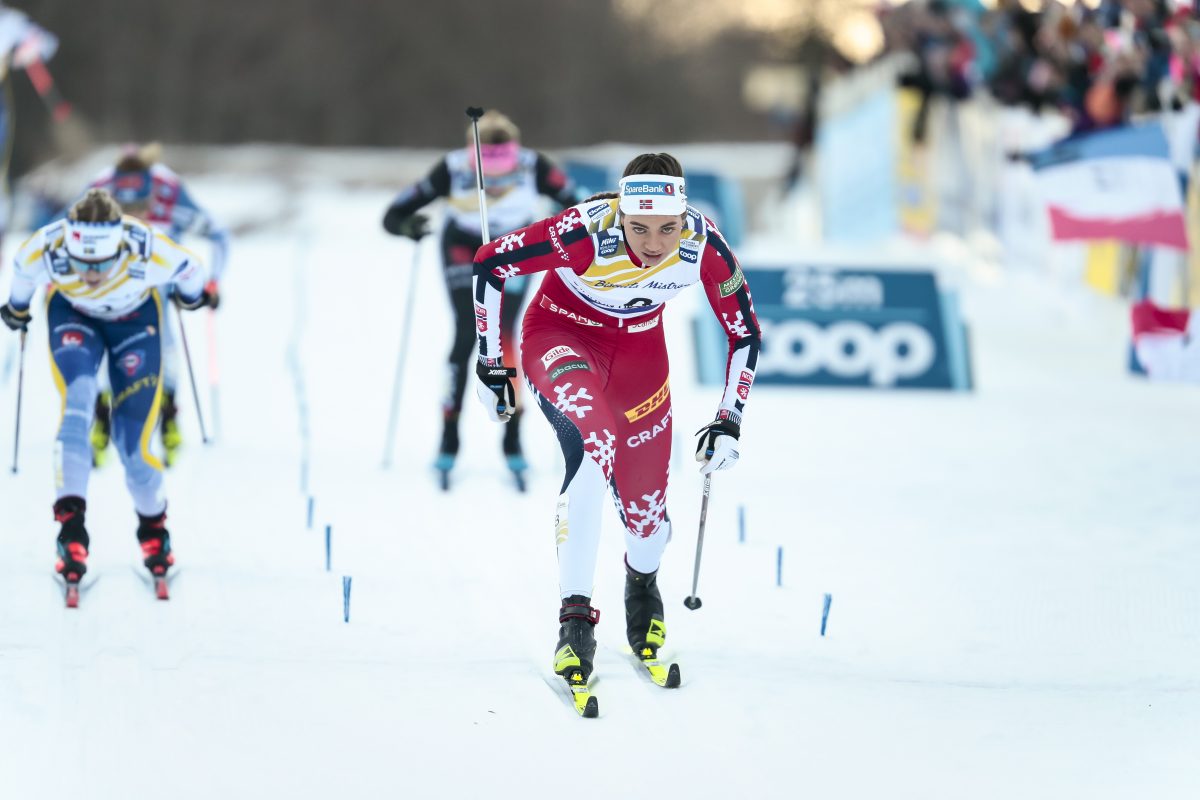Dario Cologna (SUI) may not have had time to enjoy the scenery, but his efficient performance left little room for excitement at the front of the men’s 35 kilometer freestyle handicap start, leaving the setting the most interesting part of the day.
The sixth stage of the 2011 Tour de Ski wound its way from Cortina to Toblach, climbing for the first 16 k before a long gradual descent to the stadium, and a final 3.6-kilometer loop.
Cologna started the day with a solid 42 second lead on Devon Kershaw (CAN) with Marcus Hellner (SWE) in third +1:14.
The overall Tour, with his no-familiar relaxed and smooth style of skiing, never appeared in danger of being caught. Kershaw did cut three seconds off the lead in the first 5km, but that was as close as anyone would get.
Overall little changed through those first 5k. Hellner, and Petter Northug (NOR) in 4th, stayed steady in their respective places, but as the race continued the long climb, the Swede began to accelerate. He reeled in Kershaw, and quickly left him behind, while Northug was caught by the main chase group, which included Alex Harvey (CAN) and Lukas Bauer (CZE).
Hellner moved to within a minute of Cologna, but was unable to get narrow the gap further. Cologna continued to look strong on the final hills in Toblach, using a powerful V1 to re-open the gap.
He came across the line, welcomed by an enthusiastic crowd. Cologna was born on the Italian border, speaks the language, and is somewhat of an adopted son of the country. If one of their own was not to win, the Italians would be happy to cheer on Cologna.
The win gave Cologna 15 additional bonus seconds, adding to his already sizable total. Hellner came through 1:06 back and picked up 10 more seconds.
“It was very though, as it was a long way to ski alone…I had to fight hard, and I am of course happy that I have an advantage for the last two stages,” said the understated Cologna at the post-race press conference.
Meanwhile the race for third was more hotly contested. At 12.7 kilometers, Kershaw was in third, but still one minute up on the pack. But he was off on his own, and over the next six kilometers he was quickly reeled in.
Kershaw held his position over the top of the climb, but once the winding descent began, there was little he could do.
With Harvey in the lead, the pack closed the final gap at around the 20k mark.
“When we were 20 meters behind him, I yelled at him, so he knew we were coming,” Harvey told FasterSkier. He wanted to be sure his teammate knew the pack was coming.
“Sometimes the pack comes in fast, and by the time you accelerate, you can be off the back,” Harvey explained.
As Harvey skied by, he turned to his teammate, checking in on how he was doing. Instead of going right to the back, Kershaw slotted in right behind Harvey.
At several points during the climb Bauer chose to attack. Down in the overall, he needed to make up significant time to get back into the hunt for the top spot. But without any steep hills, he couldn’t break away.
Harvey maintained excellent position throughout the race, always skiing in the top three or four of the group.
“I wanted to make sure if he [Bauer] decided to attack I could react,” Harvey said.
Bauer made one last effort right after Kershaw was caught, but Harvey responded, and the rest of the pack quickly closed the small gap.
“It would be very hard to ski away,” Harvey said. “He was trying on the climb to put the hurt on…but he couldn’t shake anyone. There is a big advantage in following.”
According to Harvey, the group was never well organized with only a couple of skiers willing to do any work at the front.
“Basically it was just Northug and I,” the 22-year-old Canadian said. “We would try to pass the lead to somebody else, and no one would want to work.”
Twelve strong, the pack skied through the stadium before heading out on the last loop. But the reluctance of the group to work together had taken a toll – they lost 30 seconds over the previous 5k, and even a hard push to the finish could barely undo the damage.
“People started fighting for third place instead of trying to catch Hellner,” Harvey said. “So the pace got pretty slow toward the end.”
Despite missing his championship form, Northug still had enough to work his way toward the front of the pack, positioning himself perfectly for the final sprint. He skied clear of a surprising Martin Jaks, moving into third overall, and claiming five bonus seconds.
Harvey was just behind in fifth, and Kershaw remained in contact with the main group, placing tenth.
“Long skate race wasn’t good on my end. Lost A LOT of time,” Kershaw tweeted after the race. “Hard to stay away from a hard charging group unless you are Hellner/Dario.”
Definitely frustrated by the lack of help in the chase pack, Harvey said, “If we had been a bit more organized we may have been able to close another 20 seconds on Hellner. Its too bad people weren’t willing to lead a bit.”
Harvey did say that you never know how peoples’ skis are running, noting that both he had an Northug had very good skis.
But ultimately, the Canadian was not impressed with most of the chase pack. “When you see Northug working, it is worth working. Sometimes the guy will just follow, but not today.”
Bauer, never a sprinter, ended up exactly where he didn’t want to be – at the back of the pack in 13th, paying a price for his inability to break off the front.
FIS has not made “time-of-the-day” results available.
Ivan Babikov (CAN), finally back in his preferred distance skating discipline, moved up to 25th, with a strong race as he works to set himself for a run up the standings in the final climb.
Kris Freeman (USA) was not as successful. He dropped from 20th to 28th after holding position for the first part of the race.
The skiers now get a final day off before the last two stages – a 20km mass start classic on Saturday, and the final climb on Sunday.
The field has taken a beating with illness running rampant through several teams. Alexander Legkov (RUS) did not start the race, despite sitting in fifth overall. The overall World Cup leader entering the Tour, Legkov has a fever and has returned home to rest.
Eleven other men did not start, and one more, Loris Frasnelli (ITA) dropped out. Frasnelli, who has made his mark more as a sprinter had been having an excellent Tour and started the day in 13th.
American Andy Newell was another to withdraw, citing a need to focus on preparing for later races. With both sprints down, and Newell not performing well in the distance races, the move was not a surprise.
Topher Sabot
Topher Sabot is the editor of FasterSkier.



